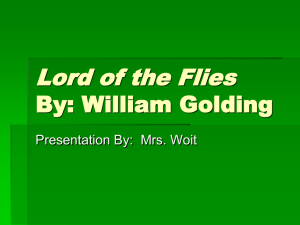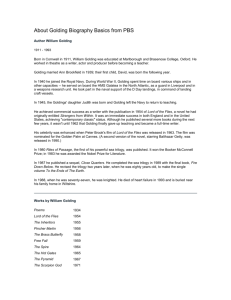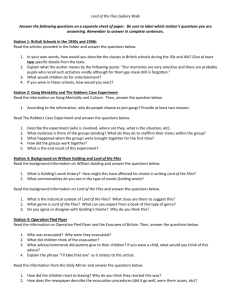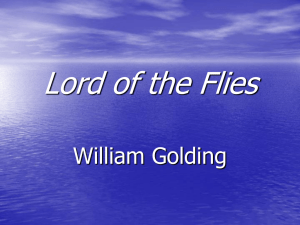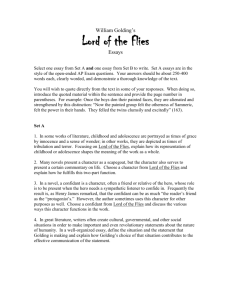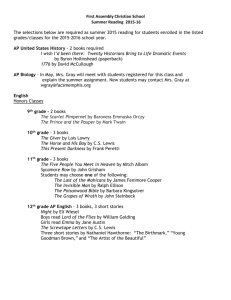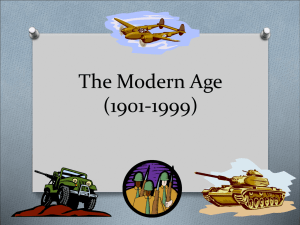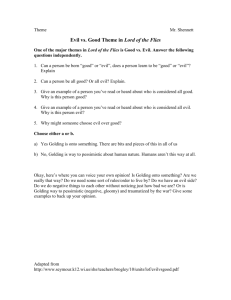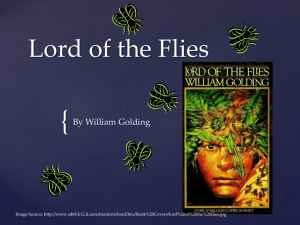Lord of the Flies Pre-Reading Guide
advertisement
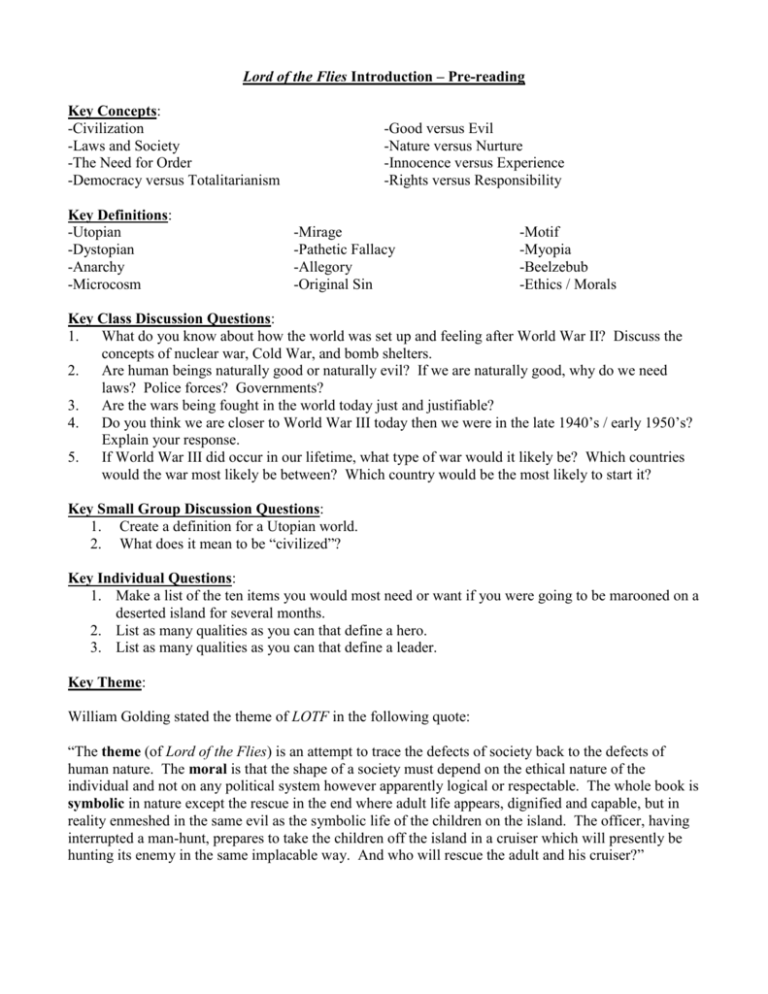
Lord of the Flies Introduction – Pre-reading Key Concepts: -Civilization -Laws and Society -The Need for Order -Democracy versus Totalitarianism Key Definitions: -Utopian -Dystopian -Anarchy -Microcosm -Good versus Evil -Nature versus Nurture -Innocence versus Experience -Rights versus Responsibility -Mirage -Pathetic Fallacy -Allegory -Original Sin -Motif -Myopia -Beelzebub -Ethics / Morals Key Class Discussion Questions: 1. What do you know about how the world was set up and feeling after World War II? Discuss the concepts of nuclear war, Cold War, and bomb shelters. 2. Are human beings naturally good or naturally evil? If we are naturally good, why do we need laws? Police forces? Governments? 3. Are the wars being fought in the world today just and justifiable? 4. Do you think we are closer to World War III today then we were in the late 1940’s / early 1950’s? Explain your response. 5. If World War III did occur in our lifetime, what type of war would it likely be? Which countries would the war most likely be between? Which country would be the most likely to start it? Key Small Group Discussion Questions: 1. Create a definition for a Utopian world. 2. What does it mean to be “civilized”? Key Individual Questions: 1. Make a list of the ten items you would most need or want if you were going to be marooned on a deserted island for several months. 2. List as many qualities as you can that define a hero. 3. List as many qualities as you can that define a leader. Key Theme: William Golding stated the theme of LOTF in the following quote: “The theme (of Lord of the Flies) is an attempt to trace the defects of society back to the defects of human nature. The moral is that the shape of a society must depend on the ethical nature of the individual and not on any political system however apparently logical or respectable. The whole book is symbolic in nature except the rescue in the end where adult life appears, dignified and capable, but in reality enmeshed in the same evil as the symbolic life of the children on the island. The officer, having interrupted a man-hunt, prepares to take the children off the island in a cruiser which will presently be hunting its enemy in the same implacable way. And who will rescue the adult and his cruiser?” William Golding – The Author and His Times William Golding was born in 1911 and grew up in the years before World War II. That war changed thinking about man's essential nature. Before the war people generally believed that man was essentially good-hearted and society often was evil. However, the atrocities of the war made it impossible for many people to believe any longer in man's basic innocence. You can see the influence of this shift in thinking in Golding's works. Some of Golding's favorite childhood authors were Edgar Rice Burroughs (Tarzan of the Apes), Robert Ballantyne (Coral Island), and Jules Verne (Twenty Thousand Leagues Under the Sea). Each of these books portrays man as a basically good creature who struggles to avoid the evils of society. Golding yearned to be like the characters in the fables and stories he read. The island setting for Lord of the Flies and the names Ralph, Jack, and Simon have been taken from Coral Island. “They held me rapt,” Golding once said of the books he read. “I dived with the Nautilus, was shot round the moon, crossed Darkest Africa in a balloon, descended to the center of the earth, drifted in the South Atlantic, dying of thirst.... It always sent me indoors for a drink-the fresh waters of the Amazon.” At about the age of twelve Golding decided to be a writer. He planned a twelve-volume work on trade unions but could never complete the enormous undertaking. With his love of reading and his early attempts at writing, Golding of course studied literature in college. When World War II began in 1939, Golding joined the Royal Navy. He saw action against German warships, he was in antisubmarine and antiaircraft operations, and in 1944 he was involved in the D-Day naval support for the landings on the beaches of Normandy. He continued to read the classics even as he acquired a reputation for loving tense combat. And his war experiences changed his view about mankind's essential nature. Because of the atrocities he witnessed, Golding came to believe that there was a very dark and evil side to man. “The war,” he said, “was unlike any other fought in Europe. It taught us not fighting, politics or the follies of nationalism, but about the given nature of man.” After the war Golding returned to teaching in a boys' school, which may explain why the characters in Lord of the Flies seem so real. Ralph, Jack, Piggy, Simon, and the other boys are based on the faces and voices of children Golding knew. Thus his reading of the classics, his war experience, and his new insight into humanity laid the groundwork for his writing. His first three novels were very much like novels he had read, and he called them the “rubbish” of imitation. They have never been published. His fourth novel was Lord of the Flies, and when it was finally accepted for publication in 1954, it had been turned down by more than twenty publishers. The book was not considered a success at first. It was not until the 1960s, when it had captured the imaginations of college and high school students, that critics began to acknowledge Golding's talent. Even now there are differing opinions about the novel. Some believe Golding's writing is bombastic and didactic, that he does not allow you to have any opinion but his. Other critics see him as the greatest English writer of our time. You will find that part of the fun of his book lies in deciding for yourself what you think. Golding has continued to write in spite of the controversy over his work. It would seem that the criticism, rather than frightening him, only challenges him to continue writing. In the same way, Golding challenges readers to think about what he considers most important: the true nature of human beings. The three novels that followed Lord of the Flies - The Inheritors, Pincher Martin, and Free Fall - brought him more success, while the controversy over his talent, or lack of it, continued. Eventually Golding stopped teaching to write full time. In 1983 Golding was awarded the Nobel Prize for Literature, which is given a writer not for one particular volume but for the body of his work. This was the recognition and respect that many believe he had deserved all along. William Golding passed away in England in 1993.
